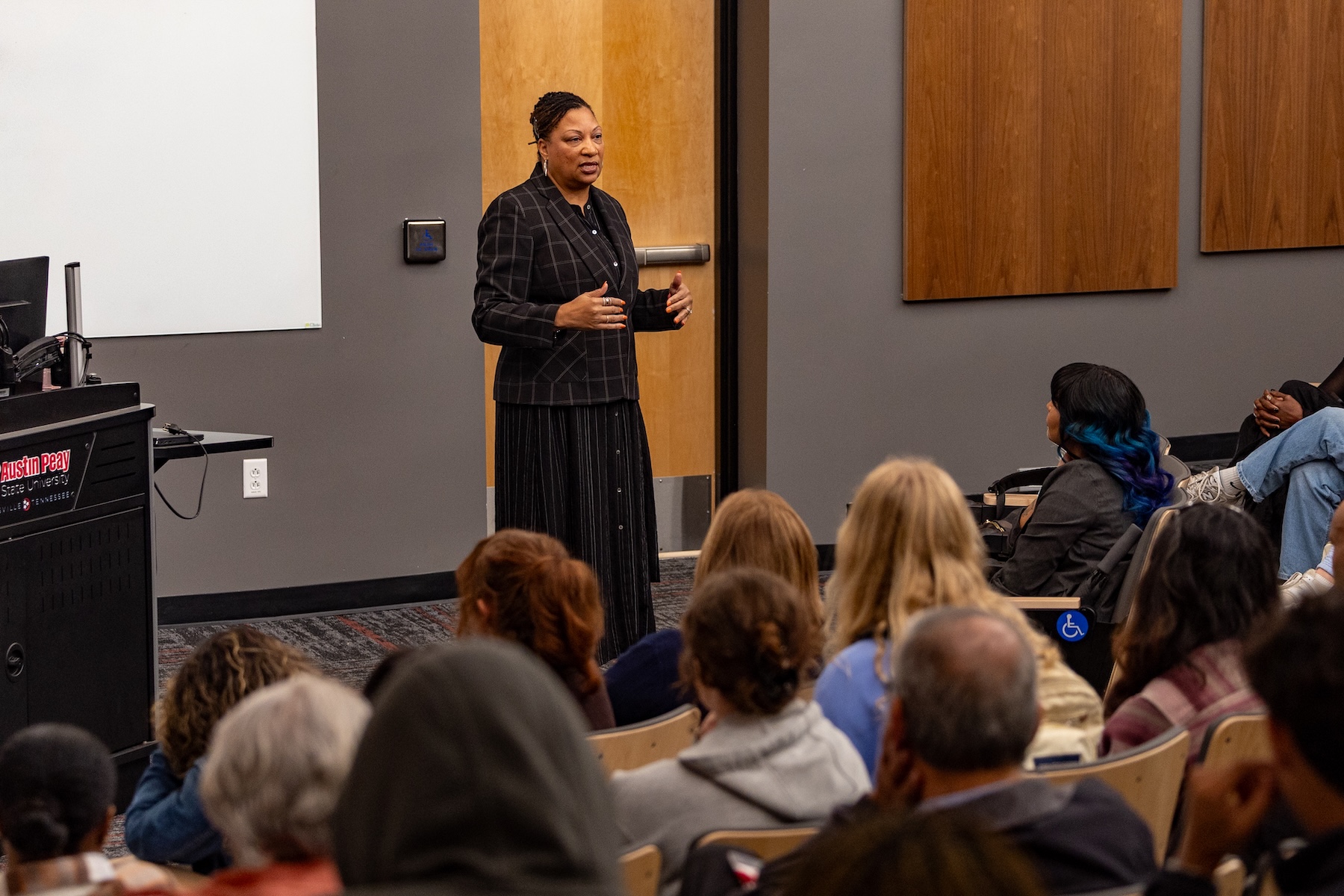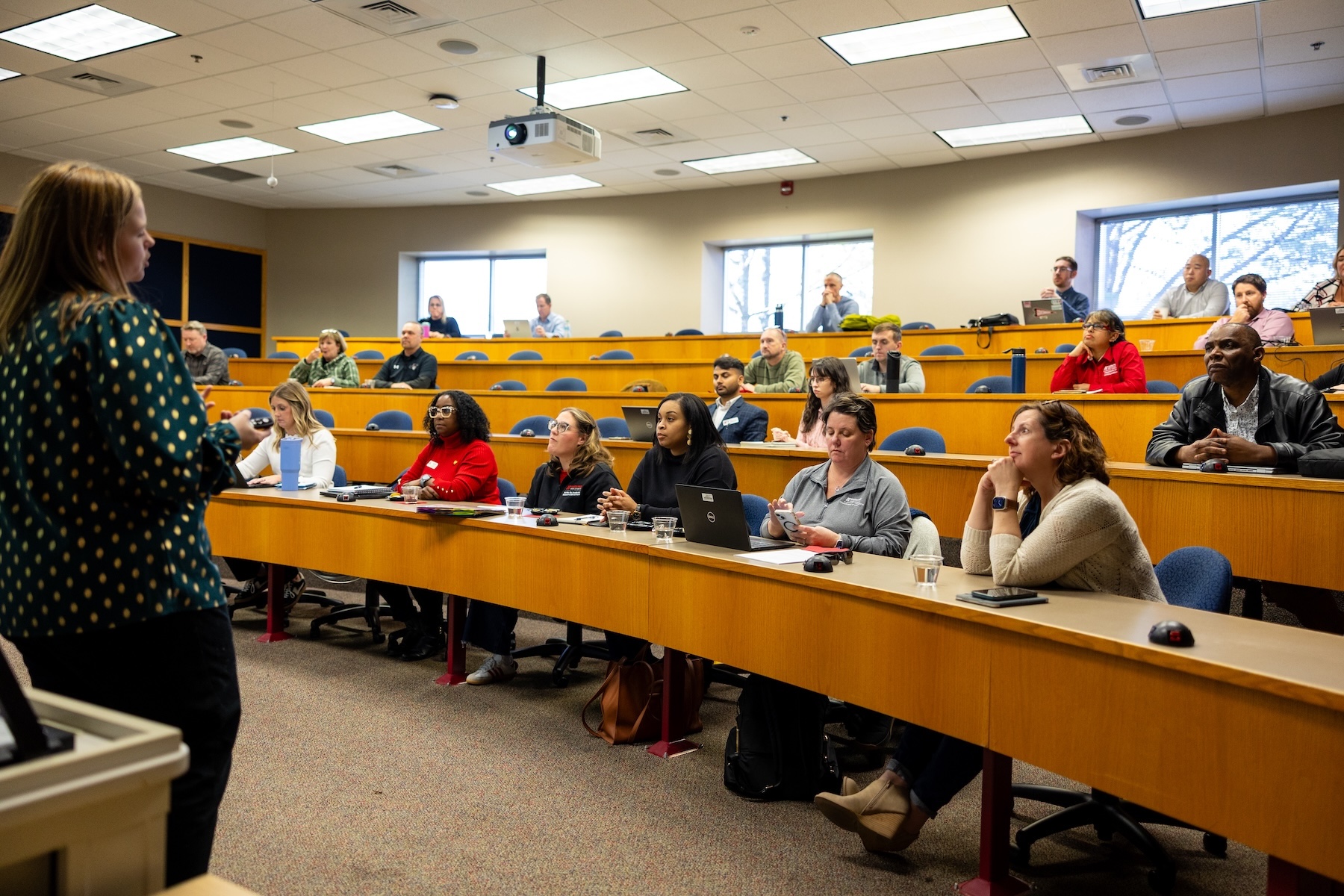Actor Wardell Julius Clark hosts ‘Anti-Racist Theatre Practices’ masterclass at Austin Peay
(Posted March 3, 2021)

Wardell Julius Clark, an activist, actor and Jeff Award winner for director, recently taught a masterclass for APSU students to inform them of anti-racist theatre practices to use in the theatre today. He used his experiences to help strengthen the topic of anti-racist practices.
Clark begins every rehearsal with a quote from James Baldwin and his Tuesday night masterclass was no different.
“If any white man in the world says, ‘Give me liberty or give me death,’ the entire white world applauds,” Baldwin said on the Dick Cavett Show. “When a Black man says exactly the same thing, word for word, he’s judged a criminal, treated like one and everything possible is done to make an example of this bad news, so there won’t be any more like him.”
The quote set the tone for Tuesday’s masterclass.
Theatre code of conduct
Clark began discussing the history of Chicago’s activism and focused on different groups that were founded dealing with anti-racist and fair hiring practices. In Chicago, film artists founded “Not in Our House,” in reaction to abominable theatre practices. This became a code of conduct for non-equity theatres.
“We are one of the only professions that does not have a regular kind of HR department for toxic behavior or unsafe behavior,” Clark said.
This movement created a unilateral code of conduct for all non-equity theatres to abide by. At the first rehearsal, this code is presented to participants and is then used to report any harassment where actors in the production do not feel safe. This code of conduct introduced an equitable and safe social justice community in the Chicago area.
Clark also discussed the Chicago Inclusion Project, which focuses on providing actors with inclusive experiences and hiring practices in the area. This project does a lot of things from casting to holding seminars.
Chitac is the Chicago Theater Accountability Coalition and seeks to identify bigotry, racism and sexism in theatrical criticism. The coalition focused on everything from using the “N” word to body shaming in theater reviews.
‘Can’t keep existing the way we’ve always existed’
Clark then discussed the turmoil of the last year.
“There is a boiling point called American racism bubbling out of the pot with systemic injustice after systemic injustice after police brutality,” Clark said. “As the pot pops off, every facet of the country decides to commercialize Black Lives Matter. We saw how everybody wanted to be good white people, but it quickly becomes a commercial.”
After seeing no change, a 33-page manifesto was released to the American theatre. This manifesto demanded equity for all actors and demanded for the actors to be seen as artists, to be paid as artists and to be respected as the unique human beings they are.
“There has to be something to stop it, there has to be some kind of turn or caveat,” Clark said. “We can’t just say we’re anti-racist theatre and keep existing the way we’ve always existed.
“Now in 2021, you have to be diligent about the work. There can no longer be just white stages anywhere,” he said. “If we care, we have work to do. It starts with educating ourselves and doing actual research.”
Clark went into detail about when actors take on a role in a different culture, time period or moment in history, it’s important for them to understand and research that culture so they can do it justice.
He ended the masterclass with words of encouragement for the viewers. Clark discussed the great amount of work that has to be done to achieve true anti-racist theatre practices in the world today.
“We were a product at best,” he said. “We were programmed to be a product at best and were solicited to come to a program to fill a quota. We have some hard work to do. This is the necessary work, it is hard, uncomfortable work.”
Up next
Another masterclass, “Musical Theatre Voice,” will be hosted by Tony and Drama Desk-nominated stage and film actor Adam Pascal. The class will be offered twice, at 3 and 5:30 p.m. on March 17.
Pascal will work with three musical theatre students during both classes, and each class will allow time for questions. The classes are free and open to the public.
To register for either class, visit https://www.apsu.edu/theatre-dance/masterclass_registration.php.
To learn more
To learn more about the APSU Department of Theatre and Dance, visit www.apsu.edu/theatre-dance/.
News Feed
View All News
Austin Peay State University's Zone 3 Press, with support from the Center of Excellence for the Creative Arts, is hosting NEA Creative Writing Fellowship recipient and award-winning writer Toni Jensen for a free public reading and book signing at 7 p.m. on Thursday, Feb. 19, in Art + Design Room 120.
Read More
David Hogan of Ribbon Communications and David "Buck" Dellinger of the Clarksville-Montgomery County Economic Development Council (EDC) will share their real-world perspectives on leadership, innovation, and career development during this semester's speaker series.
Read More
Title III grant funding recently allowed 16 faculty members from across campus to participate in the Career Readiness Academy, an extended workshop series focused on labor market tools, curriculum development, and National Association of Colleges and Employers (NACE) competencies.
Read More